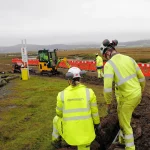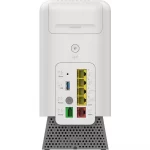Global IPv4 Internet Address Supply Hits Critical Level – ISPs Must Prep IPv6
The Internet Corporation for Assigned Names and Numbers (ICANN), which among other things is the international organisation that has responsibility for Internet Protocol (IP) address space allocation (IANA use to do this), has warned that the global supply of IPv4 addresses has now reached a “critical level” and thus IPv6 adoption has become a “requirement for any network that needs to survive“.
ISPs assign a unique IP address to your connection each time you go online and the IPv4 standard – Internet Protocol version 4 (e.g. 85.23.56.198) – remains the dominant method for practically all internet-capable hardware and software. However the Internet has become a busy place with lots of users and devices, all needing an IP address.
Advertisement
But you can only have around 4 billion addresses and since 2011 the IPv4 space has been in a state of gradual depletion, with Europe’s Regional Internet Registry (one of five RIRs in the world), RIPE NCC, handing out its final blocks in September 2012 (here).
As a result most RIRs have been rationing their supply of IPv4 addresses and now ICANN has officially begun the process of allocating the remaining small blocks to the five Regional Internet Registries, including RIPE NCC. As a result IANA’s IPv4 Recovered Address Space registry now only contains around 10 million addresses, which in the grander scheme of things is practically nothing.
Leo Vegoda, Operational Excellence Manager at ICANN, said:
“The IANA IPv4 Recovered Address Space registry contained about 20 million IPv4 addresses earlier today and is now about half that size. Redistributing increasingly small blocks of IPv4 address space is not a sustainable way to grow the Internet. IPv6 deployment is a requirement for any network that needs to survive.”
Axel Pawlik, Managing Director of the RIPE NCC, told ISPreview.co.uk:
“This is likely to be the last significant allocation of IPv4 addresses we receive from IANA. With three of the five RIRs now running IPv4 exhaustion policies, it is more important than ever that network operators accelerate full deployment of IPv6, which provides enough addresses for the rapid expansion of connectivity, to new devices and around the world.”
Thankfully Internet providers have a solution called Internet Protocol v6 (IPv6). The IPv6 standard has been around since the 1990’s and offers addresses that are significantly longer (128bits), written in hexadecimal, separated by colons and arguably more secure by design (IPSEC as standard). An IPv6 address, in its longest form, might look a little bit like this: 2001:cdba:0000:0000:0000:0000:2257:9652 (note: this can be shrunk to 2001:cdba::2257:9652).
The problem is that you can’t just create a new IP standard like IPv6, which can handle 340 trillion trillion trillion addresses, and expect the two to be directly compatible and indeed they’re not, which means that ISPs need to adopt dual-stack networks that allow both methods to play nicely together for the foreseeable future (eventually everything will be IPv6-only but that could take decades).
Advertisement
Unfortunately this transition period remains somewhat of a minefield given the mixed support for IPv6 addresses in hardware and software, particularly the older kit that’s still widely used. Similarly the need to retain backwards compatibility with IPv4 for some years to come can create other issues.
Some big ISPs have a large stockpile of IPv4 addresses but in order to stretch that out further they have to use solutions like internet address sharing (Carrier Grade NAT), which can create problems for many Internet systems that use unique IP addresses to identify, process and or block user activity (e.g. if you block a specific IP address from a service then that will impact others sharing the address). It can also create problems for some online games.
So far both PlusNet (here) and BT (here) have already played around with this and more are likely to follow, although in an ideal world we think that the best solution would be for ISPs to offer the ability to disable CGNAT in case of connection difficulties. But we’re not quite there yet and some ISPs have a sizeable pool of IPv4’s left, although eventually even they will have to adapt (some sooner than others).
In the meantime it’s amazing to think that there are still some sectors, such as certain router manufacturers, that continue to put hardware and software out without including IPv6 support as standard. Check out this article for more UK ISP opinions on the subject.
Advertisement
Mark is a professional technology writer, IT consultant and computer engineer from Dorset (England), he also founded ISPreview in 1999 and enjoys analysing the latest telecoms and broadband developments. Find me on X (Twitter), Mastodon, Facebook, BlueSky, Threads.net and Linkedin.
« Wiltshire and South Gloucestershire UK Broadband Rollout Update
Vodafone UK Boosts 4G Mobile Broadband with Netflix Content »
















































Comments are closed